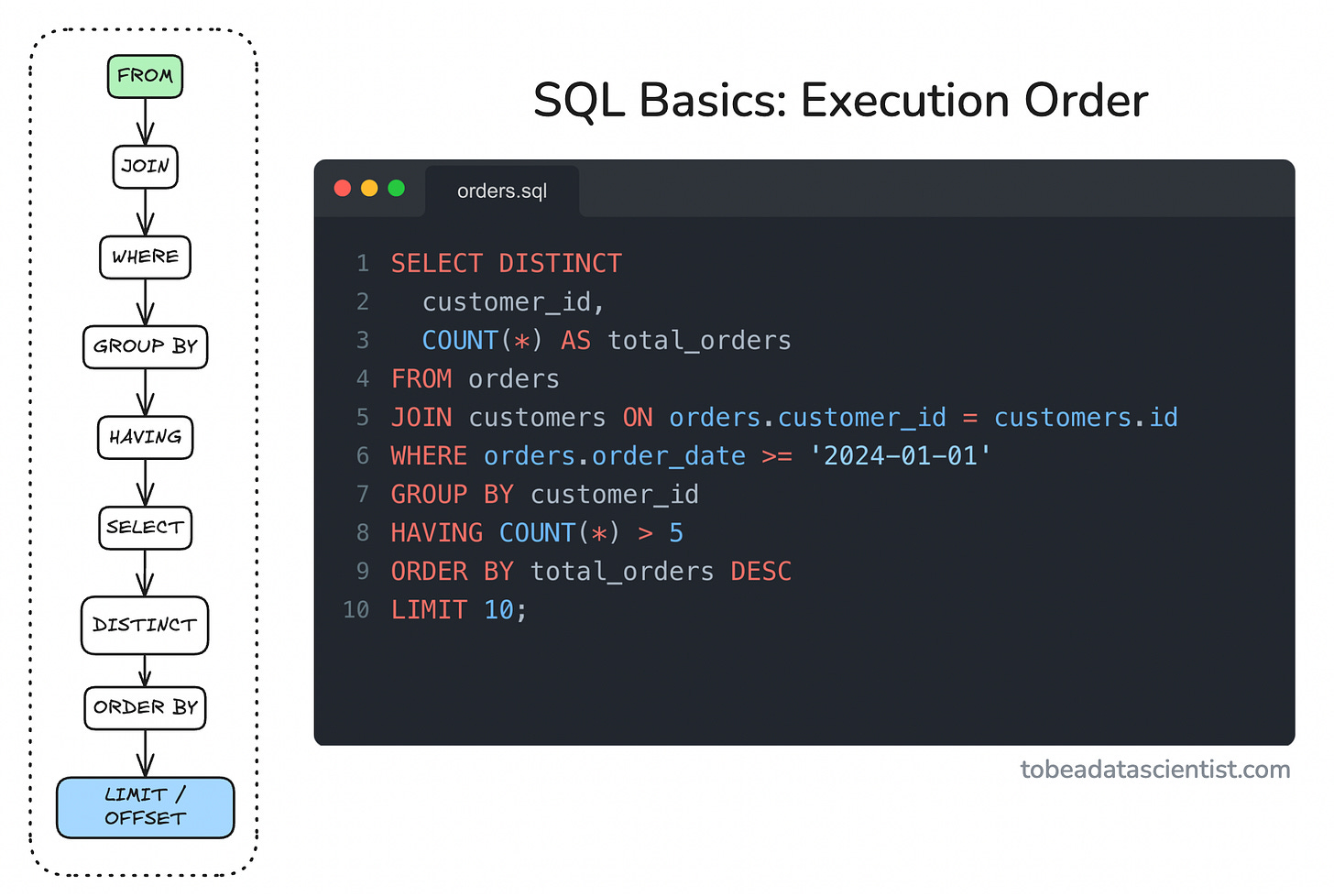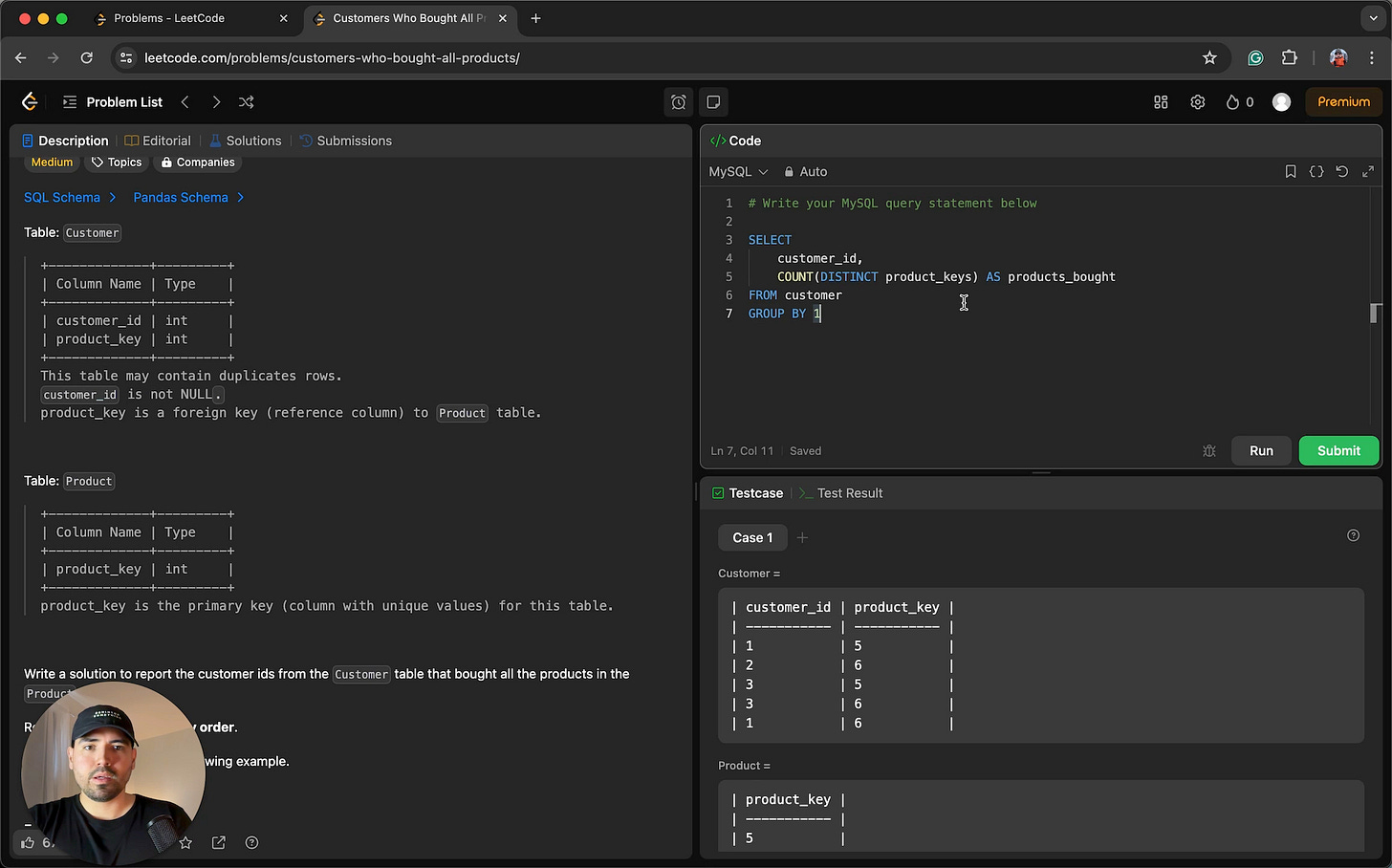The only constant in life is death
And if we are talking about Data Science interviews
The only constant is SQL
Okay that might be bit of a dramatic opening, but…
One thing is for sure, whether you are interviewing at a start up or at a fortunate 500 company, SQL is almost always part of the technical interview process
Which means this isn’t optional prep.
It’s essential.
So in today’s article I will tell you everything you need to know to prepare effectively and ace your next interview.
This is what we’ll cover:
Building a strong foundation
Understanding the evaluation criteria
Common SQL interview formats
My 4 tips for success
(For paid subscribers) 🎥 Video walkthrough of how to approach a real interview question.
Building a strong foundation
Before you tackle tricky interview questions, you need a solid foundation. Everything builds from here and if these basics aren’t second nature, the harder stuff will trip you up.
At a minimum you should master these concepts:
Aggregations: How to group and summarize data using
COUNT,SUM,AVG, etc.Formatting strings: Learn how to clean and manipulate text using
LOWER(),SUBSTR(), and similar functions.Joins: Understand how to combine tables using
INNER,LEFT,RIGHT, andFULLjoins.Date manipulations: Be comfortable extracting and comparing dates using functions like
DATE_TRUNC()orDATEDIFF().
But if you want a real competitive edge, learn these:
Subqueries and Common Table Expressions (CTEs): Practice breaking down complex logic into clean, readable chunks using
WITHand nested queries.Window Functions: Master tools like
RANK(),ROW_NUMBER(), andLAG()to perform advanced calculations across rows.
💡 I’ve created a free 6-week SQL roadmap for Data Science & Data Analytics. Whether you are just getting started with SQL or need a refresher, this roadmap should help you get there. Don’t forget to give the repository a star ⭐️.
Understanding the evaluation criteria
Before we dive into practice problems, it’s important to understand how interviewers actually evaluate your answers.
It’s not just about getting the correct result, these are the key criteria they’re looking at when assessing your SQL performance:
Logical reasoning
Communication
Code quality
Efficiency
Proficiency
Let’s break it down…
1. Logical Reasoning
Your ability to analyze and solve problems using a step-by-step logical approach.
It involves understanding the problem, breaking it down into manageable parts, and devising a coherent solution.
2. Communication
Your ability to explain your thought process, justify your solutions, and articulate the reasoning behind your SQL queries.
Good communication also involves listening to and addressing any follow-up questions or concerns.
3. Code Quality
This criterion assesses the readability, structure, and maintainability of the SQL code.
High-quality code is well-organized, uses consistent naming conventions, and includes comments that clarify complex parts of the script.
4. Efficiency
How well the SQL queries are optimized for performance, aiming to minimize computation time and resource usage.
It involves selecting the right joins, and employing efficient query optimization strategies to minimize cost and response time.
5. Proficiency
The depth of your SQL knowledge and ability to apply various database concepts and commands accurately and quickly.
It’s important to solve as many questions as possible within the time given to demonstrate your proficiency in SQL.
What to expect during the SQL Interview
🖥️ Different formats: You might be asked to write SQL in a text editor, on a whiteboard, or even just read a query and explain what it does.
📈 Progressive challenges: Expect more than one question, starting simple and gradually increasing in complexity.
🤔 Follow-up questions: Interviewers will often dig deeper to assess your reasoning, edge-case handling, or understanding of performance tradeoffs.
My 4 tips for success
I’ve been interviewing in data & analytics for the past 7 years, and I’ve managed to pass every single SQL round successfully. I’ve also helped many aspiring data scientists do the same.
So I can say this with confidence: Having a clear framework to approach every problem is key.
This 4-step framework is what consistently works:
Ask: Always clarify any uncertainties regarding the database schema or requirements to ensure your SQL queries are well-targeted and effective.
Think aloud: Verbally explain your SQL query logic and decision-making process as you structure your queries, helping interviewers understand your approach.
Don’t be silent: Maintain a dialogue, especially during tricky query constructions, to demonstrate your analytical thinking and engagement with the problem.
Do not rush: Take your time to thoroughly analyze the data requirements and optimize your SQL code, ensuring accuracy and efficiency in your solutions.
📣 Quick announcement
Our next monthly live Q&A (for paid subscribers) is this weekend!
What other perks do you get as a paid subscriber?
Full access to all public + premium posts.
A free copy of my Data Science Project Ideas PDF (2025 edition).
A free copy of “Data Science Interview Case Studies (2025 Edition)“.
A 25% off coupon for a 1:1 mentoring session.
Occasional live Q&As and exclusive workshops.
🎥 Video Walkthrough
Watch me solve a real SQL challenge as if I was doing it live in an interview, so you can learn how to think, code, and communicate like it’s the real thing.







